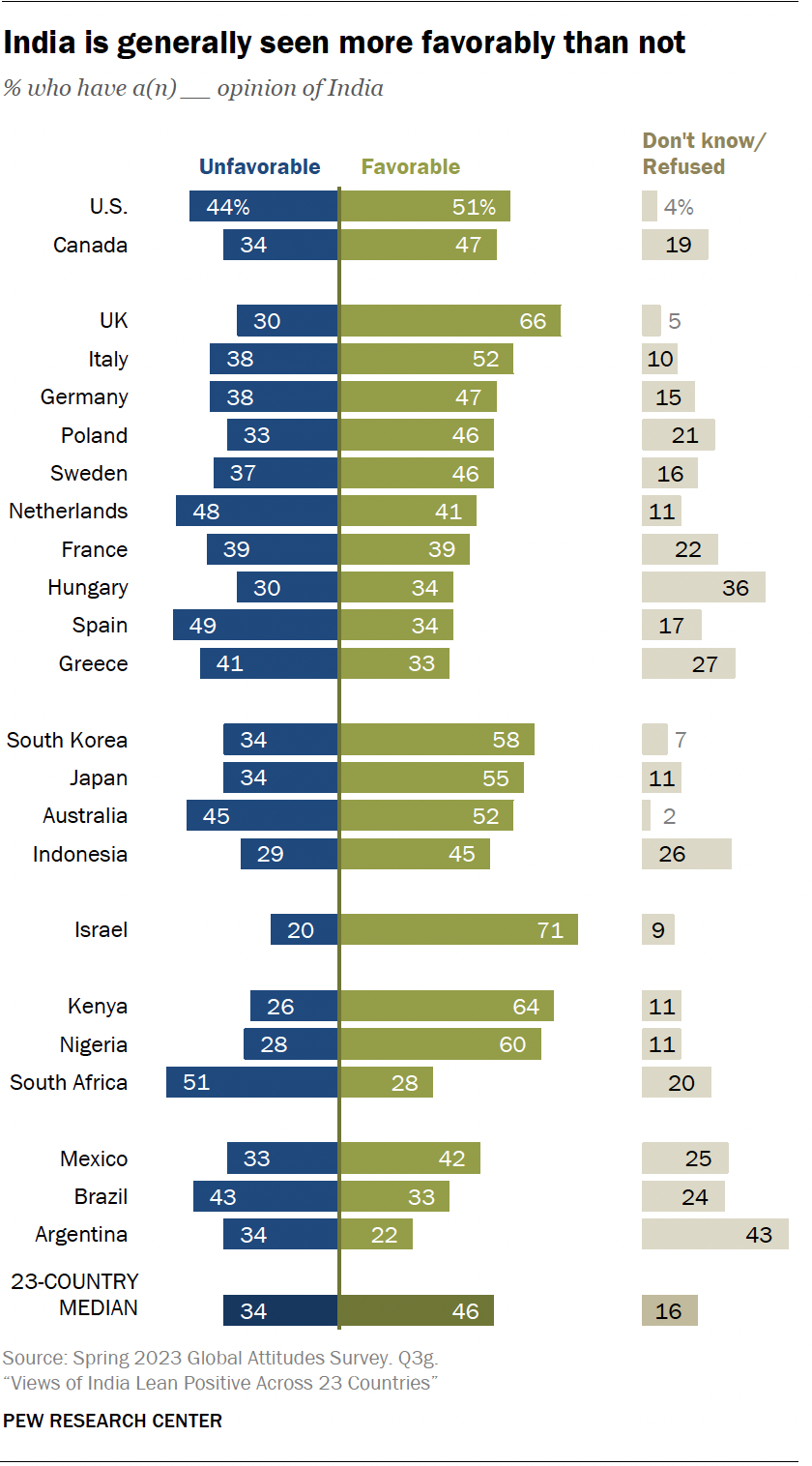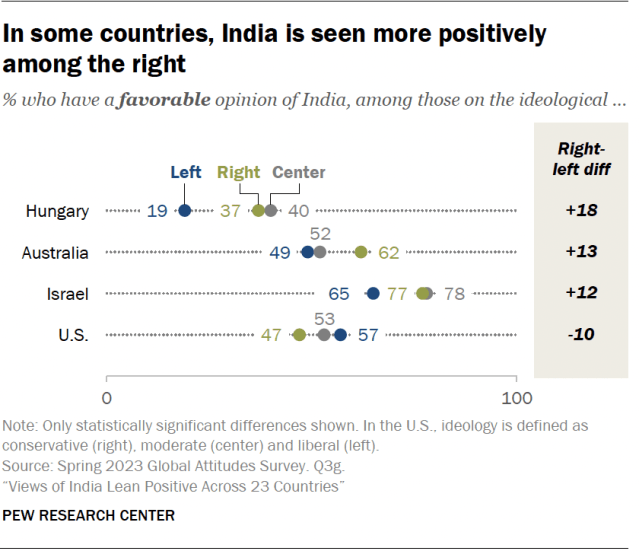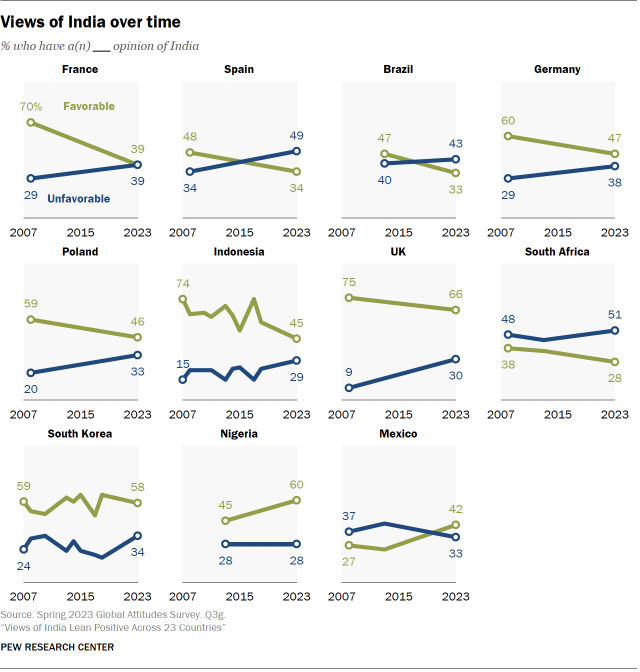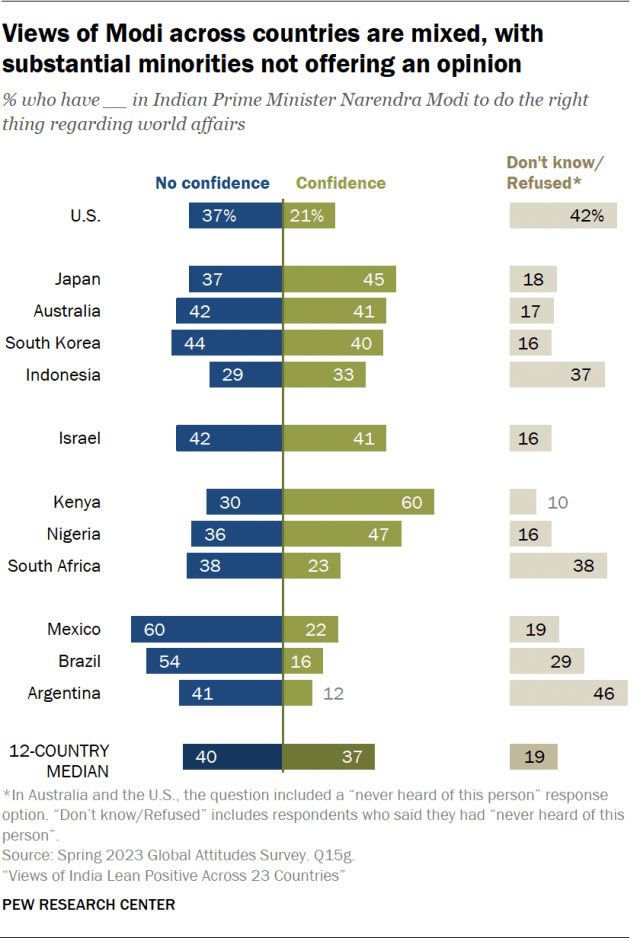Many of the 23 countries surveyed report a relatively favorable view of India. A median of 46% say they have a favorable view of India, compared with a median of 34% with an unfavorable view. Substantial shares in some countries also do not share an opinion (16% median).

Views of India are most positive in Israel, where 71% say they have a favorable view of the country. India and Israel are both part of the I2U2 – a partnership among India, Israel, the U.S. and the United Arab Emirates – and India is the top destination for Israeli arms exports. India is also seen especially favorably in Kenya, Nigeria and the United Kingdom, where at least six-in-ten say they have a favorable view of the country. Kenya and Nigeria additionally stand out for having about a quarter who have a very favorable view of India.
In contrast, South Africans see India more critically than favorably. About half say they have an unfavorable view of the country – including 36% who hold a very unfavorable view, while 28% report a favorable opinion. About half in the Netherlands and Spain also say they have a critical opinion of the country.
In most countries, at least one-in-ten do not share an opinion on India. Argentines are particularly likely to not offer an opinion of the country (43%). About a third in Hungary and roughly a quarter in Brazil, Greece, Indonesia and Mexico also refrain from answering the question.

Political ideology also plays a role in how India is evaluated in some cases. In Hungary, Australia and Israel, those on the political right report more favorable views of India than those on the left.
The opposite is true in the U.S., where liberals are 10 percentage points more likely than conservatives to hold a favorable opinion of India.
Favorable views of India are likewise more common among supporters of some populist parties in Europe. In Greece, supporters of Greek Solution – a right-wing populist party – and supporters of Syriza – a left-wing populist party – are more likely than nonsupporters to hold a favorable view of India. Similarly, supporters of the centrist Five Star Movement in Italy, right-leaning National Rally in France and right-wing Vox in Spain all see India more positively than those who do not support each of these parties. Notably, supporters of these parties are not more likely than nonsupporters to have an opinion on India. For more information on how we classify populist parties, read Appendix B.
How views of India have changed over time
Views of India have been measured before in some of the countries surveyed this year. Across these select countries, views of India have generally become more negative since the question was last asked.

In Indonesia and South Korea, where opinions of India were last recorded in 2018, favorable views of India have declined by 12 and 6 percentage points, respectively. Among the African and Latin American countries, which were last asked about views of India in 2013, evaluations have become more critical in Brazil (-14 points) and South Africa (-8), but more positive in Mexico (+18) and Nigeria (+15). Views of India have also become critical across some European countries, which were last surveyed about India in 2008.
Confidence in Indian Prime Minister Narendra Modi

Opinions of Modi are mixed, with a median of 40% saying they have no confidence in Modi to do the right thing regarding world affairs and a median of 37% saying they have at least some confidence. Substantial minorities in most countries did not share an opinion, and respondents in Europe were not asked about the Indian leader.
Mexicans and Brazilians are especially critical of Modi, who is often described as promoting a Hindu nationalist ideology and leads the Bharatiya Janata Party (BJP), which some experts classify as a right-wing party. At least half in these countries say they do not have confidence in him to make the right foreign policy choices. Those in Argentina, South Africa, South Korea and the U.S. are also more likely to lack than have confidence in India’s prime minister if they offer an opinion at all.
In contrast, those in Japan, Kenya and Nigeria are more likely to have confidence in Modi’s abilities. Kenyans are especially confident, with a 60% majority saying they have at least some confidence in Modi to do the right thing regarding world affairs.
In Indonesia, Japan and South Korea – countries where trend data are available – confidence in Modi has remained largely unchanged since we first asked this question in 2015. Notably, the share who does not offer an opinion on Modi has declined in all three countries. The difference is greatest in South Korea, where 16% now do not provide a response, compared with 34% in 2015.


